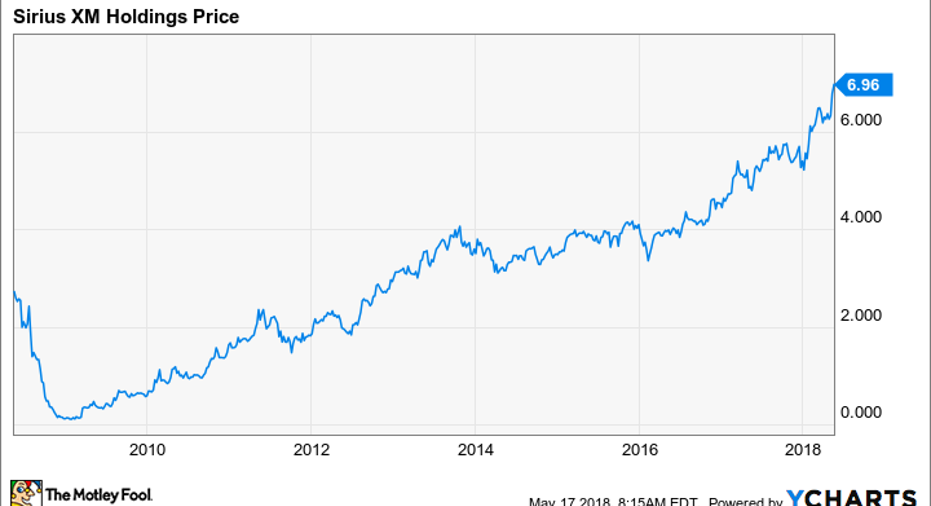Could Sirius XM Holdings Inc. Be a Millionaire-Maker Stock?

When satellite radio was launched, it offered a refreshing option for people tired of the rigidity of traditional radio. At the time, most music was still purchased in CD form. The idea of unlimited access to nearly every song ever for around $9.99 a month was in its infancy, as was podcasting.
When Sirius and XM merged in 2008 to become Sirius XM Holdings Inc. (NASDAQ: SIRI), the combined company still filled a need. It offered depth and niche choices in music that conventional radio did not. In addition, the service had talk offerings led by Howard Stern that were unlike anything found on terrestrial radio, and an impressive array of sports broadcasting rights.
For many years, the subscription service had a compelling and unique offering that allowed it to steadily grow its subscriber base as well as its stock price. That ride continues, but it may come to an end.
Sirius XM is not a millionaire maker
Satellite radio has lost some of the factors that once made it special. Multiple companies including Apple and Amazon offer unlimited music-streaming services, and the proliferation of unlimited-data smartphone plans allows people to use those services in their cars. On top of that, the podcast market has exploded with top-tier talents offering free professional-quality shows.
All that has not caused major headaches for Sirius XM so far. In the first quarter, the company topped 33 million subscribers for the first time, and its total revenue grew by 6% to $1.4 billion. Earnings per share (EPS) grew from $0.04 in Q1 2017 to $0.06 in Q1 2018.
Sirius XM added 330,000 subscribers in Q1 and expects to add 1 million over the course of the year. Those are solid numbers, but growth has slowed over the past few years, and it's unlikely to pick up.
Solid, not spectacular
Things are not dire for Sirius XM. The company's relationship with car companies gives it prime real estate in nearly every new car sold. That makes it easy for consumers to subscribe to the service, and its radio-like interface makes it familiar for older customers.
Still, satellite radio no longer offers much that's unique beyond Stern, who openly talks about retirement, and live sports. It's still a good, convenient service, but younger customers have no real need for it.
Sirius XM faces the same risks that cable companies do with cord-cutting. Who needs better radio stations when unlimited streaming lets you build playlists tailored to your personal desires? Why pay for talk radio when so much of it can be streamed for free?
A niche service
Like cable, satellite radio won't be going anywhere anytime soon. It's not a dying service or company; it's just one whose biggest growth is behind it.
Sirius XM still fills a niche for people who want their car listening experience to be as easy as possible. That's a sizable market (for now). But it's one that will slowly shrink as consumers decide that their phone offers all the entertainment choices they will need.
10 stocks we like better than Sirius XM RadioWhen investing geniuses David and Tom Gardner have a stock tip, it can pay to listen. After all, the newsletter they have run for over a decade, Motley Fool Stock Advisor, has quadrupled the market.*
David and Tom just revealed what they believe are the 10 best stocks for investors to buy right now... and Sirius XM Radio wasn't one of them! That's right -- they think these 10 stocks are even better buys.
Click here to learn about these picks!
*Stock Advisor returns as of May 8, 2018
John Mackey, CEO of Whole Foods Market, an Amazon subsidiary, is a member of The Motley Fool's board of directors. Daniel B. Kline owns shares of Apple. The Motley Fool owns shares of and recommends Amazon and Apple. The Motley Fool has the following options: long January 2020 $150 calls on Apple and short January 2020 $155 calls on Apple. The Motley Fool has a disclosure policy.



















